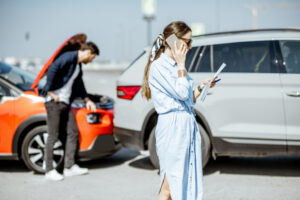As autonomous cars become more common on Florida roads, new questions are emerging around responsibility and liability. If you’re involved in an accident with an autonomous vehicle, who is at fault in a self-driving car accident?
This question is more complicated than it might seem. Traditional car accidents usually involve a human driver who can be held responsible. With self-driving cars, the line between human error, mechanical failure, and software malfunction gets blurry. Here’s what you need to know about driverless vehicles, how legal liability works for a personal injury case in Florida, and how an experienced car accident attorney can help.
Understanding the Levels of Automation
Before diving into fault, it’s important to understand the levels of automation:
- Level 0-2: Driver-assist features; human remains in control
- Level 3: Conditional automation; a car can drive itself under certain conditions
- Level 4-5: Fully automated vehicle; no human input needed
Most vehicles on the road today are still Level 2 or below. This means the human behind the wheel is still primarily responsible, even if the driverless cars have advanced features like lane keeping or adaptive cruise control.
Who is Liable in a Self-Driving Car Crash?
In Florida, multiple parties might be responsible in a self-driving car crash, depending on the circumstances:
1. The Human Driver
Even in vehicles with self-driving features, human intervention is expected and necessary. If a driver fails to do so due to distracted driving or other reasons, they could still be found at fault. This is especially true for Level 2 and Level 3 vehicles.
2. The Self-Driving Car Manufacturer
If the accident was caused by a flaw in the autonomous driving system, where the self-driving car failed, the autonomous vehicle manufacturer could be held liable under product liability laws. This includes manufacturing defects in sensors, software, or hardware.
3. The Technology Provider
Sometimes, third-party software developers develop and maintain the autonomous software. If an error in the software led to the self-driving accident, that company might share liability.
4. Fleet Operators or Commercial Owners
If the self-driving car is owned by a ride-sharing service or delivery company, the company could be held responsible for maintenance, training, or oversight failures.
5. Other Drivers
It’s still possible that the driver of the other vehicle caused the accident involving the autonomous vehicle. Just because a car was in self-driving mode doesn’t mean it was to blame.
Florida’s Comparative Negligence System
Florida uses a comparative negligence standard, which means more than one party can share the blame, and this can affect liability insurance. If you’re found to be partially at fault, your compensation could be reduced by your percentage of fault.
For example, if you were 20% responsible for the accident and your damages totaled $100,000, you could recover $80,000. This rule applies regardless of whether a human or a robot was driving.
How Investigations Are Different with Self-Driving Cars vs. Traditional Vehicles
Accidents involving autonomous vehicles often necessitate a deeper investigation, which requires an experienced legal team.
- Data logs: Self-driving cars often record detailed data before, during, and after a crash. These logs can be critical to determining what went wrong.
- Software analysis: Investigators may need to dig into code and algorithms to find flaws.
- Third-party experts: Engineers, accident reconstructionists, and software analysts are often needed.
This complexity makes it essential to have experienced legal counsel who understands Florida law, manufacturer liability, insurance policies, and the technical landscape.
Why Self-Driving Car Accidents Are a Growing Concern
As autonomous vehicles become more common, so do the risks—and the legal complexity that comes with them.
- Sensor failures: Cameras, radar, and LiDAR can be blocked or misinterpret data.
- Software glitches: An incorrect calculation could lead to serious injury or death.
- Drivers can become over-reliant: Human drivers may tune out, thinking the car is entirely in control when it isn’t.
As the number of these vehicles increases, so do the accidents involving them. And when they happen, the legal terrain is far more complex than a typical fender bender.
The Insurance Puzzle: Who Pays?
Insurance coverage is another layer of complexity in self-driving car accidents. Traditional policies assume a human driver is responsible. When a vehicle is operating autonomously, insurers may dispute coverage based on:
- Whether the human was supposed to intervene
- Whether a mechanical or software defect triggered the crash
- Whether a commercial policy (such as for a ride-share company) applies instead of personal auto insurance
In Florida, Personal Injury Protection (PIP) coverage applies regardless of fault, but serious injury claims often go beyond PIP limits. That’s when determining personal liability and identifying the right insurer becomes crucial. Navigating these claims and proving fault may require coordinating between multiple policies, including those held by manufacturers, software companies, and fleet operators.
What to Do If You’re In a Self-Driving Car Accident in Florida
- Call 911 immediately.
- Get medical attention, even if injuries seem minor.
- Document the scene: Take photos, gather witness information, and note vehicle makes and models.
- Get insurance info from all parties, including the vehicle owner and any company affiliated with the vehicle.
- Avoid speculation about fault on the scene or on social media.
- Contact a KFB Law attorney experienced in emerging vehicle technologies and Florida injury law.
Legal Help Matters: Talk to KFB Law Today
At KFB Law, we understand how overwhelming it can feel when the usual playbook doesn’t apply, and insurance companies often look to shift blame.
We take the time to understand every angle of your case, from vehicle data logs to the roles of manufacturers, software providers, and the human operator. With more than 50 years of combined experience and deep roots in the Tampa Bay community, KFB Law is here to support you through every step of the legal process.
If you’ve been hurt in an accident involving a self-driving vehicle, don’t wait. Reach out to KFB Law for a free consultation. We help clients across Tampa, St. Petersburg, Wesley Chapel, and beyond get the guidance they need when it matters most, along with fighting for fair compensation.



